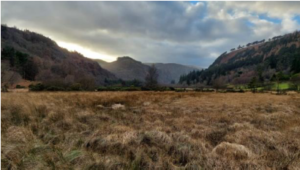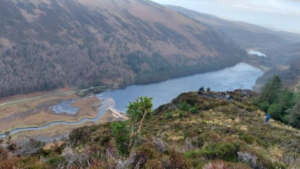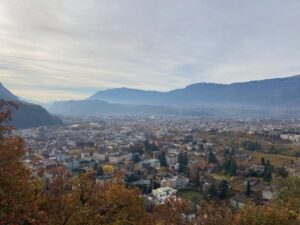Archive for March, 2022
Creating countless memories in Dublin, Ireland
- Electrical Engineering and Information Technology, PhD
- Dublin, Ireland
- University College Dublin
- 01.09.20221 – 28.02.2022
Preparation/Internship Search:
Since my early bachelor’s days, the prospect of studying abroad has been tempting and fascinating to me. However, during my undergraduate, I couldn’t find the right time to study abroad. With the start of my PhD at RWTH Aachen University, I approached my professor with the idea of a research visit. He liked the idea and initially suggested a research visit in the latter half of 2020. With the COVID-19 pandemic eventually bringing everything to a stand-still, we postponed further preparation to early 2021. Despite the still ongoing COVID-19 pandemic, we went on with my professor getting in touch with a colleague of his at University College Dublin who works on similar topics as my chair back at RWTH Aachen University. The professor at University College Dublin was quickly convinced of such a research visit, mutually benefiting both institutions with the prospect of closer collaboration and exchange in the future. The general timeline was set from this point in time, and we entered the second stage of planning my visit. Luckily my stay as a visiting researcher was independent of any undergraduate curricular or requirements (e.g., proof of English, certain average GPA, etc.). Thus, the only thing that University College Dublin required was to fill out one form to register as a visiting researcher officially and have these documents signed by my professor. As such, any kind of tuition fees, which are common to be paid at Irish universities, were waived. At RWTH Aachen University, a little bit more preparation was involved. Firstly, we had to officially apply for a leave from my duties as a scientific assistant. Secondly, we contacted the International Office and prepared all documents for the ERASMUS+ Internship application. Closer to the start of the research visit, I was eventually able to register myself with University College Dublin. The process itself was very smooth and didn’t take much time.
Apartment search in Dublin:
Being used to the “cheap” cost of living in Germany, searching for apartments in Dublin might come as a shock. The average price for renting is much higher than in Germany (typically two to three times higher for a shared living), with landlords typically renting for one year or more. In the case of private dorms renting is based on a trimester basis (meaning only for four or eight months). Hence, finding a cheap place for just half a year is quite challenging. Despite University College Dublin offering a housing program, the prices rank on the same level as renting from private landlords/companies. Furthermore, due to my somewhat late application, I could not get a place in the housing program at University College Dublin. Eventually, I settled with a mixed approach, living in an expensive private dorm for the first four months in the city center before moving in with a few colleagues for the last two months close to University College Dublin. Usually, it is required to pay the whole renting sum (>several thousand) in a student dorm before moving in as monthly payment rates are only offered for long-term rents.
Commuting/Travelling in or around Dublin:

© Alexander Meyer
Transportation in and around Dublin is mainly limited to bus service only. There exist two metro lines called the Luas, respectively the green and the red line serving some parts of the city. Nonetheless, typically buses are the go-to option. To commute to University College Dublin, only buses are available with frequent schedules along the major routes. Especially during the morning and the evening, delays and disruptions in the rush hours are to be expected as most traffic is funneled through the highly congested city center. The Google Maps app proved to be the most reliable for accurate prediction of bus arrival times. Worth mentioning is the leap card used for all transportation in Ireland, as typically only a leap card is accepted as a form of payment. These can be bought at many shops and charged via NFC using an app on your smartphone. Additionally, students are entitled to get a Student Leap Card, offering lower fares for daily commuting. Nonetheless, even the reduced student fares for transportation/commuting to and from university/somewhere are much higher than in Germany. Besides public transport, many taxis exist that can be conveniently called and paid using the FreeNow app. Typically, taxis can be called via the app in less than five minutes, even outside the city center. Also, taxi rates are fixed and much lower compared to Germany, making it a favorable option, especially late at night. However, during the closing hours of bars and pubs during the weekend, getting a taxi can be tricky with the FreeNow app malfunctioning or taxi drivers picking up people on the street directly without relying on the app.
Daily Life:
Daily life in Dublin is not much different from any major city in Germany. Shopping for groceries/daily necessities is very convenient with various supermarkets/local shops such as Lidl, Aldi, Tesco, SuperValu, Centra, or Spar, to name a few, to be found everywhere in Dublin. Prices are not much different from Germany and can be generally categorized on the same level. Only ordering products online might take more days for delivery as most are brought in via the United Kingdom or France. Also, ordering food from all cuisines is very convenient, with a large variety to choose from with prices typically lower than dining in restaurants.
Health Insurance/Telephone/Banking:
My health insurance covered me during my visit at no extra cost. With the newly introduced regulations on roaming charges for mobile carriers by the European Union, I simply continued using my existing contract. However, with extra costs imposed on regular phone calls, I generally placed calls via Whatsapp or FaceTime to avoid being charged extra. Finally, I also continued using my bank account at no extra charges for banking. Contrary to Germany, a debit/visa card is typically accepted, so there is no need to carry cash in Ireland. To transfer money between friends, generally, Revolut or Paypal are the preferred go-to-apps.
Research:
During early talks with my professor/supervisor at University College Dublin, we had only agreed on a general outline for the research visit. Upon starting my research here at University College Dublin, I was offered various opportunities to work on exciting projects within the scope of the initial agreement. As there was no mandatory coursework to complete, I could solely focus on research, enjoying a high degree of autonomy and freedom. Whereas my work was primarily focused on simulation and developing models, now and then, measurements in the lab needed to be conducted. Also, publication and revision of the latest results were a significant part of my work, where I could benefit from the extensive knowledge existing in the group already. To keep in touch with my supervisors, there was a group meeting held every week in which the latest results/news about the chair and each PhD’s work were discussed, and a short report was submitted to the professor. Additional meetings were held whenever necessary. At University College Dublin, I had my own cubicle space, sharing a large office with all my fellow PhDs in the same group. There I was provided with all the resources required to conduct my research. Additionally, due to the open workspace culture, it was straightforward to get in touch with my colleagues and make new friends at work. With PhDs joining from across the globe, the group was very international, with people of various backgrounds, cultures, and an open-minded orientation. Consequently, besides working together on inspiring projects, we bonded over various social events on the weekends.
Leisure in Dublin:
With some restrictions on pubs and restaurants eased at the beginning of my stay, I got a chance to enjoy Dublin’s extensive pub and restaurant culture. Wherever you wander in Dublin, one can be sure to find a cozy place offering a pint of Guinness or some proper, triple-distilled Irish whiskey and some Irish band playing traditional music in the background. Generally, pubs and bars close around 2 am to 3 am, so somewhat earlier compared to Germany with bookings for large groups required for most places partly due to the COVID-19 restrictions that were in place. Nonetheless, the nightlife in Dublin is truly unique, where countless memories have been made. Besides the high congestion of pubs, bars, and restaurants, Dublin offers many places to visit. Among these, the most touristic ones are the Guinness Store House, telling you the origin story of Ireland’s most famous beer while enjoying an incredible view across Dublin in the rooftop bar. Or the many distilleries that offer tours and tastings such as the Teeling, Jameson, or Roe & Co distillery. Also, from a cultural point of view, Dublin has many theaters, museums, or galleries to offer. Being the capital of the Republic of Ireland, also many government buildings can be found throughout the city.
Exploring Ireland:

© Alexander Meyer
Besides working on my research during the weekdays, I tried to travel across Ireland/Dublin as much as possible. These travels were attainable despite the ongoing restrictions due to the COVID-19 pandemic, which were eventually lifted entirely to the end of my research visit. During these trips, I encountered a beautiful country with very friendly people along the way. Around Dublin, countless opportunities for hikes exist, which can be easily reached using public transport. Various trips lead me to Howth, Bull Island, or Phoenix Park in the north of Dublin or Dun Laoghaire, Killiney, Bray, or Greystones in the south of Dublin. All beautiful places which can be easily explored during on a day trip accompanied by many lovely restaurants and cafés at every spot. The most beautiful spot I encountered during my travels was the hike in the Glendalough Mountains in Dublin’s neighboring Wicklow County. Located in a natural reserve, one can truly experience and appreciate Ireland’s nature. Furthermore, trips to, e.g., Galway, Limerick, or Cork are highly recommended and can be easily reached using Irish Rail.
Conclusion:
Summing up, I genuinely enjoyed my time in Ireland. While working on exciting projects during the weekdays, the weekends were left for many exciting activities, and I enjoyed plenty of nights wandering Dublin’s nightlife with friends. Throughout my stay, I have made many new friends from across the globe, both at work and in my student dorm. Despite the high cost of rents, I would highly recommend staying at shared living at one of the plenty dorms, at least at the beginning, simply to meet many new people from all over the world. New friendships have been made, which I hope will last a lifetime. The Irish are very friendly people surrounded by a beautiful landscape that invites for countless hikes and trips in the greater Dublin area or beyond.
My internship in the hospital Bolzano, Italy
- Medicine, Diploma
- Bolzano, Italy
- Hospital Bozen
- 15.11.2021 – 06.03.2022
In Germany the last year of medicine is a practical year, in which you can visit various subjects and hospitals to gain more practical experience. It is divided into three times four months stays each. For my first two month of this practical year, I chose the hospital Bolzano in South Tyrol, Italy. Since I knew this region already from previous holidays, I thought it would be a nice change after the big exam I had in October.
Application
The application process was very easy via email. You can find all information’s you need on the website of the hospital of Bolzano. Just keep in mind to do it one year ahead of the beginning of the internship. For all other organisational matters (contracts, insurance, etc) a staff member, responsible for us students, helped us continuously. She also supported us regarding application and apartment- hunting.
Apartment
Finding a flat was much more difficult than applying for the internship, as the housing market in Bolzano is very scarce and overpriced. Nevertheless, many students live here, and a solution can always be found. I can recommend to look in:
- Facebook groups ( Bolzano Unibacheca Universitari Affitti / Affitto Camera or Immobilienbörse Bozen Umgebung – Wohnungen PRIVAT (ver)mieten & (ver)kaufen)
- or the site: wg-gesucht.de
- and also on the university site: http://accommodationunibz.blogspot.com/.
I found a nice room in the city center in a shared flat with 5 people, which was really nice to connect immediately. Look for a room next to the city centre, since the outside areas are not that nice in general.
Transport
Bolzano is not very big, so you can easily explore the city by walking. However, the hospital was located a little outside town, so I decided to get a second hand bike. Bolzano is a very bike-friendly city. Dedicated bike lanes make it very pleasant to ride and you feel very safe. Some friends of mine preferred to go by bus and bought a Südtirol-Abo Plus card for 150 Euros, which you can also use as train ticket to Trient or cable cars of the mountains. To discover the surroundings of the city, a car is already an advantage, as you are usually much faster than by bus and can thus get to all the places. When we went skiing, we car-pooled and could go straight to the slopes with our skis in the car. It’s simply easier to move around with a car here. Unfortunately, Bolzano has no car sharing, but a bike sharing in the summer months.
Traineeship
My traineeship began in the middle of November 2021. In the Hospital we usually started at 7.30am with the morning reunion. We discussed the patients and the program for the day. After that we all went to have a coffee break together :D. During the day I was free to decide, whether I wanted to go into the surgery room or in the policlinic. The doctors were all extremely nice and polite. The working environment was very friendly and calm. We should at least stay for 6 hours to also get a free lunch, but it was also no problem if you had to leave earlier or could not come at a certain day. Lunch was rich of different options and there were always three courses—yuuummmy! After a while I definitely felt included in the team and could also relieve the doctors of work. It’s definetly an advantage to speak Italian as well as German. In South Tyrol they speak both German and Italian, but Bolzano is a little more Italian, therefore the working language in the hospital is also predominantly Italian. In the outlying areas of Bolzano people prefer to speak German. Most people however are bilingual, so you can easily get around.
Free time

© Chiara Löffler
After work there are a lot of options to spend your free time. The region here is very nice for outdoor activities. The mountains (Dolomites) are incredibly beautiful and in summer you can go hiking, climbing, biking etc and in winter it’s perfect for skiing or Snow hiking.
Since I was there in winter, I mostly went skiing. Obereggen, Seiser Almand Carezza are skiing areas that are approximately half an hour by car away from the city and have very nice slopes. You can also rent a sledge or just go hiking in the snow. You get a reduction on the skipass if you show your clinic employee card.
In March it got warmer and we were able to do some via ferrata and hikes in the surroundings (Eppan, Ritten, Jenesien). On the weekends we also did some city trips to Bologna, Venice, Milan, Verona and Lage Garda, which are all less than 2 hours by car. So, it is perfect to explore the North of Italy.
If you like to stay in town, you can drink coffee or have an Aperitivo (Aperol usually 3,5€) with friends. Expenses are quite cheap for drinking or eating and food here is really good. The weather is also amazing. Here some of my favourite food and drink stops: Bar Osteriada Picchio (book in advance), Al cantuccio (nice pizza), il Corso (nice pizza), Nussbaumer (perfect with parents), Exil Lounge (coffee place). Also I can recommend going to the cinema Film Club Bolzano, they often play movies in original language and the theatre Carambolage, who does most of their performances in German.

© Chiara Löffler

